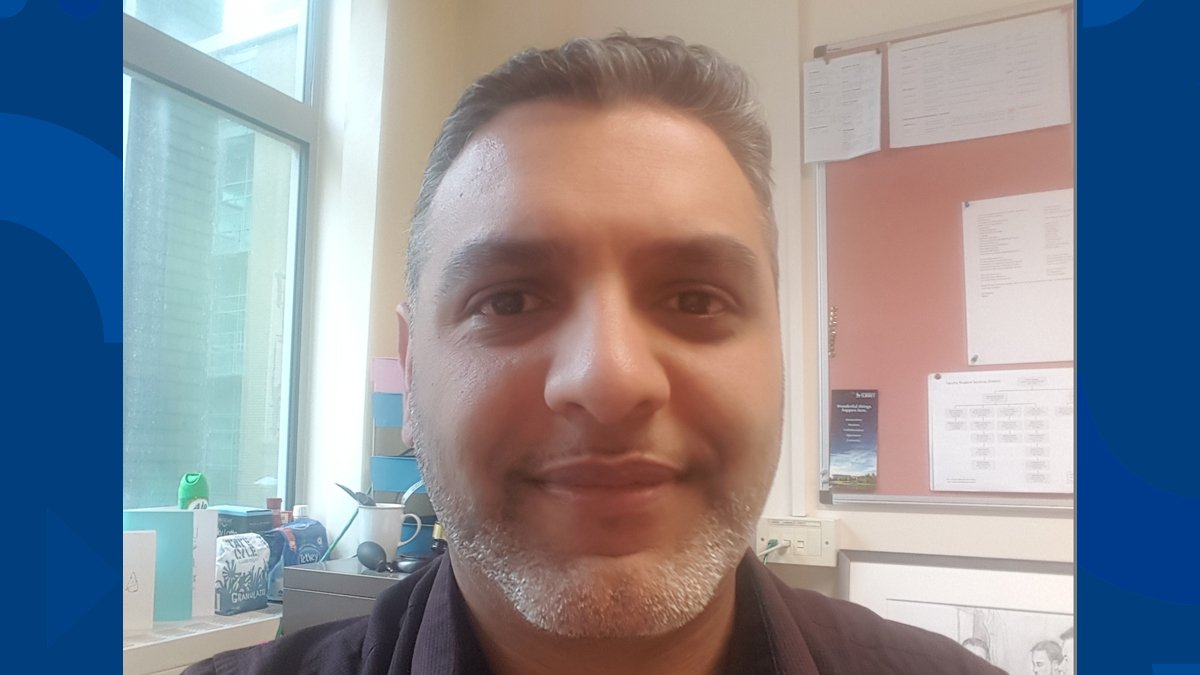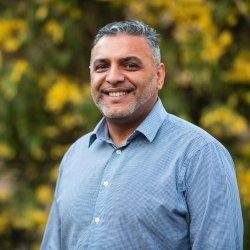Meet the academic: Dr Sarfraz Jeraj
Dr Sarfraz Jeraj, Senior Teaching Fellow, reveals what inspired him to get into clinical psychology, what he loves about teaching the next generation of clinicians and what he’s looking for in a postgraduate psychology student.

“I’m passionate about social justice, engaging with people to make a positive difference in their lives and fulfilling my purpose. I love my family, especially my three mini teachers (my children), my friends and my community.”
What’s your background in psychology?
Well, psychology wasn’t on my original agenda! I studied physiology at undergraduate level and went on to work in IT. After being made redundant, I put on a backpack and went travelling for six months to figure out what I wanted to do with my life. During this time, I found myself and my faith. I figured out that I wanted to make a difference to people’s lives by providing care to them.
Looking back at my childhood, I was always interested in understanding variances in people. Although we were close in age and had the same upbringing, my brother and I were always so different, and this fascinated me. Psychology seemed like the perfect path for me to take.
How did you become a psychologist?
After returning home, I went on to complete a postgraduate diploma in psychology, while working in a care home for adults with learning disabilities and mental health difficulties. Here, I got to see the impact that psychological interventions could have in improving the quality of people’s lives, confirming for me that this was what I wanted to pursue.
Once I graduated, I worked as an assistant psychologist in an addiction service, before going back to university to complete a doctorate in clinical psychology.
How did you get into teaching?
I volunteered at an Islamic Saturday school as a teacher and found it both interesting and rewarding. I felt really energised from the experience and wanted to do more to make a difference to people’s lives. I knew becoming an academic would allow me to do this on a wider level.
Now, as a Senior Teaching Fellow, I get to be part of the journey’s that my students take, engaging their curiosity and developing their skills using new methods. Seeing them graduate and progress in their careers to make a real and positive difference to people’s lives, is incredibly gratifying.
What’s your area of expertise?
I train clinicians to treat the difficulties that people can have with anxiety conditions like panic disorder, obsessive compulsive disorder (OCD), post-traumatic stress disorder (PTSD), generalised anxiety disorder (GAD) and phobias, using evidence-based psychological therapies, particularly cognitive behavioural therapy (CBT).
These treatments, in combination with patient-centred care, resonate with me as an individual. By adopting this approach, clinicians are better equipped to help their service users.
Why should people study psychology?
It’s fascinating to understand yourself and people, getting to grips with what makes us tick. By learning this in a systematic way, you can contribute to how we understand ourselves and have a positive impact on others.
Psychology to me is all about valuing unique people. If this is an ethos you can adopt, then this is the right field for you!
What are you looking for in a psychology student?
I’m looking for students who can reflect on themselves and their experiences. Individuals that are curious and are receptive to feedback, so they can grow intellectually and emotionally. Most importantly, a person who shows kindness towards others, emotional intelligence and has a good work ethic.
Do you have any advice for prospective psychology students?
Psychology isn’t just an educational discipline, it’s something you observe within yourself and all around you. Try formulating questions that lend themselves to study. You can try it any time, in any place!
Find out more about our postgraduate psychology courses, including our Psychological Intervention (CBT) PGDip.
